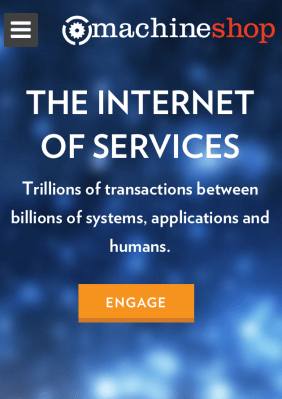In a world where everything from sensors in your shoe, to refrigerators, television and jet engines are going to be connected on the web to create the Internet of Things, there are many opportunities to help companies deliver focused services. One of the biggest opportunities is to enable the Internet of Services, which will allow tens of billions of devices connected on the web communicate with each other amid trillions of data transactions.
MachineShop, a startup focused on providing application programming interfaces (APIs) and service exchanges to help companies deliver services in the connected world, is coming out of stealth today with $3 million in its first funding round from a bunch of investors who are actually early adopters of the solution too. CSR (a developer of silicon and software for consumer electronics market), financial security systems company Diebold, Incorporated and software services company Xchanging are among customers and partners who are backing the startup.
“There are few market opportunities that can be measured in trillions of transactions, the Internet of Services is one of them,” said Michael Campbell, CEO, MachineShop who co-founded the startup two years ago along with Greg Jones. “Not only is the Internet of Services bigger than the sum of all the connected devices in the world, it’s more valuable financially to enterprises, developers, hardware vendors and ultimately to the consumers of all things connected.”
According to Gartner, Internet of Things vendors will top $309 billion in direct revenue by 2020, with most of that money stemming from services.
Given where IoT is today in terms of early pilots and aggressive push by companies such as Google to make sure they have all the pieces in place to earn billions in incremental revenue some years from now, the opportunities for startups are many.
For its part, MachineShop is betting on early customers such as CSR to go beyond the enterprise, B2B market and address opportunities in the consumer markets in future.
According to Intel, there will be around 31 billion connected devices by 2020, and all of them would be speaking different languages. So the first problem to solve is making sure they speak to each other and understand enough to turn raw data into actionable insights.
MachineShop wants to enable this communication through APIs.
“Once I have these devices connected, I don’t want want raw data but focused information, which brings business logic services that helps stream data from everywhere and converts them into information,” said Campbell. The startup will authenticate and manage each of the data transactions to ensure everything is secure.
The next piece is dedicated service exchanges through which data streams will flow to specific enterprise applications.
In some ways, MachineShop is similar to how SaaS integration startup Mulesoft connects enterprise applications in the cloud and on-premise.
“Businesses can create their own personalized middleware because it’s all service-based. We are disrupting the legacy middleware world just as Mulsoft has done,” added Campbell.
And because this middleware for Internet of Services is being built from scratch, developers can avoid creating a large, monolithic platform like how traditional middleware were created.
“We have the opportunity to say we can solve all this problems without building a monolithic system that brings consultants, costs time and money. We respect them, we are discussing with large customers using SAP as a backbone — we will augment with all that,” added Campbell.
In the old ERP world of integrating different applications, middleware was always crucial because it helped connecting disparate systems and provided a platform for software applications to talk with each other. While it worked for traditional systems, the complexities in a world where billions of devices are attempting to speak with each other across the physical and virtual worlds, is a completely different challenge.
“However, there will be a time when customers will say why do I need to have monolithic platform when I can actually have a more services-based model.”
Already different pieces of the Internet of Things are coming together — Android is becoming the standard OS and the Wolfram Alpha is attempting to become the language of applications.
The lines between software vendors, hardware suppliers and the old-world industrial conglomerates are fast blurring. There’s General Electric on one end with its Industrial Internet and on the other end Google is putting all its might to grab every piece of the puzzle.
“We have ongoing conversations with GE, and while I cannot speak for them, it looks like they want to be an interface between man and the machine. I think they look at the IBMs and Oracles and want to go after that market, ultimately competing with the traditional middleware guys,” said Campbell.
So how far could MachineShop go with its services play?
“We want to be the market leader in Internet of services, it’s going to be purely a middleware play.”
At the very core, MachineShop is attempting to simply what appears to be a very complex web of different languages, standards and applications, scrambling to deliver services across connected devices.
By bringing customers as investors, MachineShop is hoping that it will be able to learn faster from the real world transactions and evolve its product accordingly.
“The Internet of Things will not be built around products alone, “ said Will Gardiner, CFO, CSR. “We are investing in MachineShop because its technology eliminates complexity by simplifying and standardizing the way information is managed so that physical and virtual assets and services can work together in one integrated system.”
